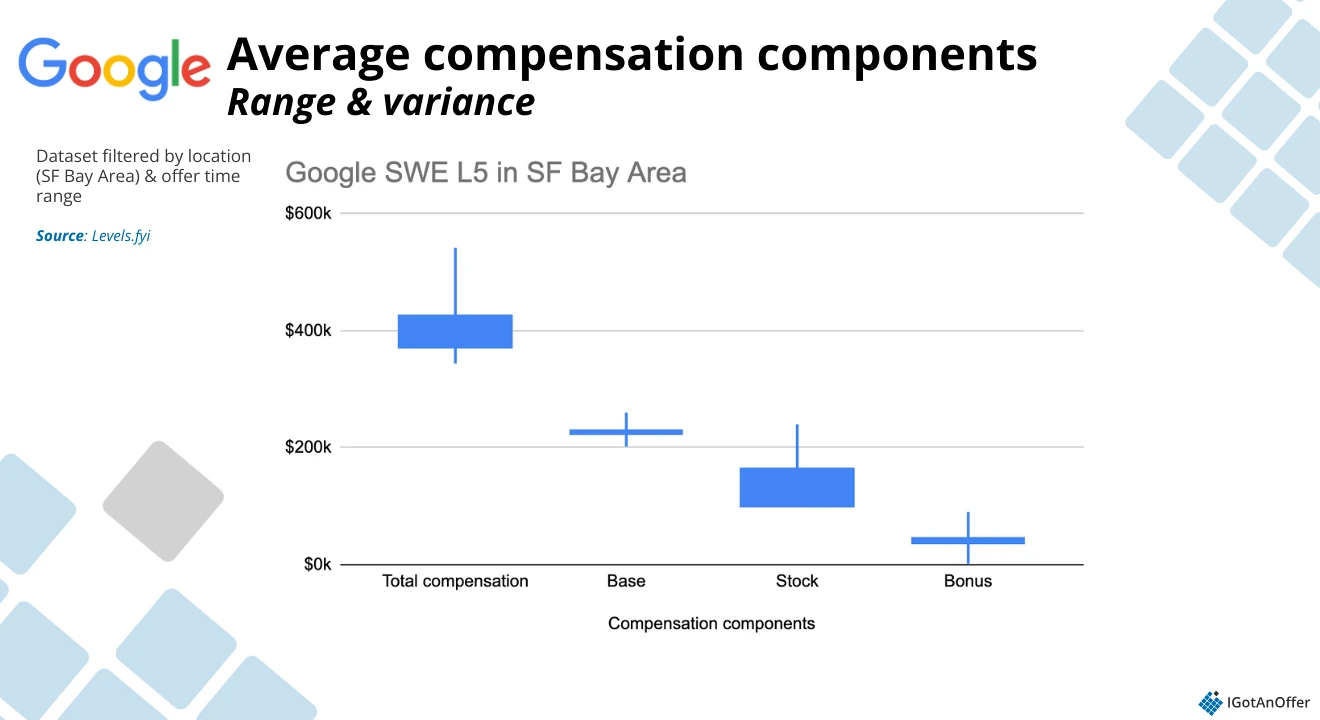You got an offer at Google. Congratulations! Now it’s time to maximize your offer.
The difference between a good offer and a great one often takes a single conversation.
Many candidates leave a $50k+ increase on the table because they fear negotiating their Google offer.
We’re here to change that. In this guide, we show you five actionable steps you can take so you can have the confidence to negotiate and secure the compensation you deserve.
Here’s an overview of our recommended steps:
- Understand Google’s compensation structure
- Find weaknesses in the initial offer
- Send a counteroffer email to your recruiter
- Handle their objections
- Get expert help
Read on to start building your confidence. Then, book a 1-on-1 session with our Google salary negotiation experts to further boost your chances of securing the best possible offer.
Click here to browse our team of salary negotiation coaches
Let’s get started.
1. Understand Google’s compensation structure ↑
Before negotiating an offer, it’s important to understand a company’s compensation structure, including which components are negotiable.
Below is a quick overview of Google’s compensation structure:
- GSUs (Google Stock Units)
- Sign-on/signing bonus
- Base pay
- Performance bonus
- Equity refreshers
- Benefits and perks
The different components of your Google offer are not all equally negotiable. You will typically get most of your increase from GSUs (Google Stock Units), followed by your sign-on bonus, and then your base salary.
This is visible when you gather offer data for a given role, level, and location.
As you can see below, for an L5 software engineer in the Bay Area, the range and variance for GSUs are a lot larger than for the sign-on bonus and base salary.
If you analyze Google offer data for other roles (e.g., product manager), levels (e.g., L4), and locations (e.g., Seattle), you’ll reach the same conclusions.

This range and variance are a great proxy for “room for negotiation”.
Throughout this article, we’ll use an L5 software engineer in the Bay Area as an example, using recent data from levels.fyi.
Google is one of the most desirable places to work in the tech sector, and it is also one of the hardest to negotiate with.
Every offer Google makes is discussed with its centralized compensation team. This team has extremely stringent policies and processes based on data-driven insights to help Google reduce employee expenses while keeping a high candidate close rate.
Every statement you make during the negotiation, from your interest in the team to the dates of your interviews with other businesses, will set off various regulations. In order to apply these guidelines, Google's compensation team instructs recruiters to ask particular questions during each negotiation.
Still, you shouldn’t fear negotiating your Google offer.
“Don't shy away from asking what you believe you deserve. It's a terrible feeling to be second-guessing your comp package during your first few months on the job,” Luis (Google Sr. SWE and salary negotiation coach) says.
Can you negotiate your Google salary?
Yes. Google salaries are negotiable. Your Google recruiter expects you to negotiate, and their initial offer won't be the maximum offer they can give you to join the company.
“The first offer is never the best offer. Most companies expect you to negotiate and even leave room in the budget anticipating that.” (Alex, expert salary negotiation coach.)
1.1 Google GSUs (Very negotiable)
1.1.1 How negotiable are GSUs?
Google always includes GSUs in its initial offer. They're typically very negotiable.
For L5 software engineers, the highest GSU grant in the most recent levels.fyi data is $240k and the median is $120k.
In almost all negotiations, the bulk of the increase comes from GSUs getting bumped. And, in the best negotiations, it’s common for GSUs to end up being on a similar level as base salary at the end of the process.
1.1.2 How do Google GSUs work?
As of 2025, almost all (99%) of Google’s offers follow the 38/32/20/10 GSU vesting structure.
With this new structure, here’s what percentage of your GSU grant you’ll receive every year:
- Year 1: 38%
- Year 2: 32%
- Year 3: 20%
- Year 4: 10%
Google’s GSUs vest monthly. So, in the first year, you will receive 3.16% of GSUs, which vest every month (38% divided by 12 months = 3.16%).
However, the vesting schedule may differ, particularly for new hires or promotional grants.
If you stay at the company for four years, you will receive all your GSUs. If you leave before that, you will lose those unvested shares.
Historically, Google used a uniform 25% per year vesting structure and schedule over four years. In 2021, it then switched to 33/33/22/12 increments for a majority of its offers to increase candidate closing rates, as it saved money by reducing total grant amounts.
Before this, Google trialed different structures with its Google Computing Group to arrive at this more optimized structure, and it continues to trial for different roles and levels.
Your $ grant will be converted to an actual number of GSUs before your employment starts. That conversion will use the trailing average closing stock price of the 30 days before your start date.
So, if your grant is worth $100K and Google’s stock average close price was $100 in the 30 days before your start date, you’ll be given 1,000 GSUs, which will vest over 4 years.
Google is among the many top tech companies that have started to adopt front-loaded vesting schedules. It’s not as stable as ‘rest and vest’, but you’ll get the financial benefits of your grants a lot sooner.
That being said, you’ll need to ace your performance reviews as equity refreshers in later years (Years 3, 4, and onward) will be highly dependent on your ratings.
1.1.3 Valuing your GSUs
There’s a lot more uncertainty around GSUs than there is around any of the other components of your compensation.
Here are the two biggest factors to think about as you value your GSUs:
- Stock price fluctuations. Google’s stock could go up or down, meaning the value of the GSUs you’re getting is bound to change. This can impact your actual financial outcome, but it isn’t something you control or can predict with certainty.
- Likelihood of vesting. Although this probably isn’t on your mind right now, you might decide to leave because you don’t get on with your manager or team. Or you might be fired as part of a reorg. If this happens within 4 years, then you can’t take full advantage of your grant.
It’s important that you take these aspects into account when assessing and negotiating your offer.
While we recommend that you negotiate higher GSUs, our advice is to also aim for a higher base and sign-on bonus, which are more certain financial benefits.
1.2. Google sign-on bonus (Negotiable)
1.2.1 How negotiable is Google’s sign-on bonus?
The sign-on bonus is a one-time benefit that Google gives as an incentive to join.
Unlike GSUs, Google recruiters often do not include a sign-on bonus in their initial offer. Still, for most technical roles and even many non-technical roles at Google, it is possible to negotiate a higher signing bonus even if it's not in your initial offer.
Google’s signing bonuses are typically capped at $50K, though based on the latest levels.fyi data, it can go up as high as $90K for experienced hires.
There are two main ways to think about your sign-on bonus, which you can use as leverage when negotiating.
- A lump sum that helps cover any bonuses (e.g., performance bonus) or unvested equity you’re walking away from at your current company.
- If you’re not walking away from anything, you can also look at it as a bridge between your start date and your first RSU vesting date.
1.2.2 How does Google’s sign-on bonus work?
Google will pay your sign-on bonus as a lump sum in the first 30 days of your employment.
If you leave within 1 year, you’ll need to pay back a prorated portion of your bonus. For example, if you leave after 6 months, you’ll have to pay back 50% of your sign-on.
1.3. Google base salary (Negotiable)
1.3.1 How negotiable is Google’s base salary?
It’s common for Google recruiters to put you at the bottom or middle of the base salary band in their initial offer. Base salary bands are a lot narrower than GSU bands. You’ll be able to achieve a base increase by negotiating, but it won’t be as big as your GSU increase.
For L5 software engineers, the highest base salary in the latest data is $260K, and the median is $227K.
1.3.2 How does Google’s base salary work?
Google’s base salary follows the typical FAANG model. Each role, level, and location has a base salary band. The band is narrower at junior levels than at more senior levels, where there's therefore more room for negotiation.
Your base salary is paid biweekly in the US and monthly in most other countries.
1.4. Google performance bonus (Not negotiable)
1.4.1 How negotiable is Google’s performance bonus?
Performance bonuses are set at the company level for each role and level and, therefore, are not negotiable.
However, any improvement you get to your base salary will be compounded by your performance bonus. So, it’s a factor you shouldn’t ignore entirely when calculating your future compensation.
1.4.2 How does Google’s performance bonus work?
In 2025, Google revamped its performance review with the Googler Reviews and Development (GRAD) system.
The system has five performance impact tiers, namely:
- Transformative impact
- Outstanding impact
- Significant impact
- Moderate impact
- Not enough impact
The ranking a specific Googler gets during the semi-annual review should determine their bonus and equity.
As a budget-neutral move, this means that an employee with an “Outstanding impact” rating will receive a larger reward, while an employee with a “Moderate impact” or lower rating will receive a reduced bonus and equity.
The move is similar to the recent shift that many tech companies, including Meta and Microsoft, are currently making to push employees to improve their performance.
1.5 Google’s equity refreshers (Not negotiable)
Google offers equity refreshers to employees who have been working at the company for at least one full year. They do this as an incentive for them to stay.
Given Google’s new performance review system, you can expect its equity refreshers to rely on performance ratings. Therefore, it’s safe to assume they’re not negotiable.
You can ask about equity refreshers during your negotiations, but you’ll find that the vast majority of recruiters will shy away from sharing any details.
1.6 Google’s benefits and perks (Not negotiable)
Google is a leader in benefits and perks and offers a Google 401k, a health savings account (HSA) match, life insurance, and long-term disability insurance, among other things.
Unlike many top tech companies like Netflix, Capital One, and Uber, Google doesn’t offer its employees a discounted stock purchase plan.
Google’s benefits and perks aren’t negotiable.
How much additional compensation can you negotiate at Google?
You can negotiate anywhere between $5k and $100k+ depending on your seniority, your skill set, and the initial offer that was made. Higher-level roles have more range for salary negotiation than lower-level ones.
2. Find weaknesses in the initial offer ↑
Now that you understand Google’s compensation components, your next step should be to find weaknesses in the initial offer you receive. You’ll then use these weaknesses as arguments for your counteroffer in Step 3.
There are two main ways to find weaknesses.
- First, you should research ranges for your role for the different compensation components we discussed using public data sources to find the areas where your offer is at the lower or middle of the range.
- Second, you should ask questions to your Google recruiter that highlight shortcomings in the offer, which you can use as arguments for asking for more.
2.1 Research ranges for the different compensation components
For the main compensation components (GSUs, sign-on bonus, and base salary), you should identify ranges for your role, level, and location. This is similar to the work we’ve done for the Google L5 Software Engineer in the SF Bay Area covered in the previous section.
You should use multiple sources when establishing these ranges. A few we recommend include Glassdoor, Levels.fyi, Comparably, and Salary.com.
As you do your research, remember that there’s a time lag between the moment offers are reported on these websites and the time at which they were actually made. In practice, this means that the ranges you will find will be lower than what’s currently being used by Google.
After doing this work, you should have a sense of how much you can ask for for each compensation component. It’s important to stay realistic as you do this exercise.
Here are two sanity checks we recommend making before settling on specific numbers you’re going to ask for.
- Don’t expect to get to the very top end of the range for all components
Broadly speaking, there are two extremes. If your aim is to maximize total compensation and you’re comfortable with the risks associated, then you could focus on maximizing your GSUs. If your priority is more certainty, then focus more on base salary and the sign-on bonus.
- Be realistic about the skill set you bring to Google
For instance, at the time of writing, Google is looking to hire more engineers amid heavy AI investments and AI-driven projects. As a consequence, people with AI expertise are the most likely to achieve the highest total compensation for a given SWE level and location.
Can you negotiate even without a competing offer?
Absolutely! The fact that you’ve received an offer should be enough.
But of course, having a competing offer gives you more leverage.
Still, if you have none, there are many ways to negotiate. Here are some tips from Luis (Google Sr. SWE and salary negotiation coach):
- If you’ve got a solid current job that is not making you rush away from it, you could use that as a ‘competing offer,’ so to speak.
- You could get your recruiter to share important bits of information from the interview feedback to gauge how well you did. If the feedback is very strong, that's great leverage.
- You could also ask for a sync with some of the team members and also get more information about the role. Using this information, you can incorporate the relevance and impact of the role into your ask.
2.2 Ask questions to your recruiter to highlight weaknesses in the offer
Another way you can uncover strong negotiation arguments is by asking questions to your recruiter. The objective of this fact-finding exercise is to highlight differences between Google’s compensation and that of other companies (including your current employer).
Here are five example questions you could ask your recruiter. You should adjust this list based on the strengths of the compensation package of your current employer and other companies you are in the process with.
Sign-on bonus
- Question: I noticed that there was no sign-on bonus in the initial offer you sent. My understanding was that Google routinely offered signed-on bonuses to new hires, as do other FAANG and tech companies. Could you confirm if that’s something that’s available for this position?
- Goal: Google recruiters often leave sign-on bonuses out of their initial offer. This question is a simple way to point out the omission.
Discounted stock-purchase program
- Question: Does Google provide a discounted stock-purchase program? When would I be eligible to participate in the program?
- Goal: At the time of writing, Google does not provide that benefit, whereas other FAANG and top companies do. You’re highlighting that weakness.
Remote work policy
- Question: Can you clarify what Google’s remote work policy is?
- Goal: Google recently placed massive restrictions on its Work from Anywhere (WFA) policy, including: 1 WFA day counts as 1 WFA week, and the use of WFA only for distant remote work and not working from home or nearby locations. This may be less flexible than what your current company allows.
Time off
- Question: What’s Google’s vacation policy?
- Goal: At the time of writing, Google’s paid time off for new hires is 15 days per year (for US offices), which might be lower than your current company or other companies you’re in the process with.
Can you lose your Google job offer by negotiating?
No, as long as you negotiate politely and respectfully, you won't lose your Google job offer.
Google has invested significantly in interviewing you. Once they make you an offer to join, the tables turn, and the recruiter's job is to convince you to accept the offer.
If you do your research well and are thoughtful about what you ask for, the worst that can happen is that your recruiter doesn't budge and says that the initial offer they made you is a final offer that's non-negotiable.
3. Send a counteroffer email to your recruiter ↑
3.1 Consider setting a “walk-away” number
How will you know if you’ve negotiated successfully? Before starting a negotiation, it can be helpful to write down your “walk-away” number. Your “walk-away” number is the minimum number or set of conditions you’re willing to accept.
If you manage to negotiate an offer that’s above that number, you’ll accept it. If you don’t, then you’ll walk away and stay at your current company, or continue interviewing.
That number or set of conditions is subjective and results from a lot of different factors, including: the research you’ve done in step 2, your other options, other personal circumstances, etc.
Having that number in mind during the negotiation will enable you to keep a cool head and to know when to accept the offer or move on.
There are many ways to make a counteroffer. Here are two we recommend considering:
- Share your walk-away number with your recruiter
Pros: It’s simple and minimizes back and forth. It also makes it clear to your recruiter how much the initial offer needs to be increased to bring you on board.
Cons: You might not be able to maximize your total compensation because your walk-away number could be lower than the maximum offer Meta was willing to make you. You also obviously can’t use that approach if the initial offer you received is already higher than your walk-away.
- Start the negotiation with a higher number than your walk-away
Pros: The main benefit of the second approach is that it has more upside than the first one. You’re more likely to maximize total compensation using that approach.
Cons: It will involve more questions, pushback, and back and forth with your recruiter. In other words, it’s more work and discomfort to go through. Working with a seasoned job offer negotiator can help a lot if you pick that approach.
3.2 Write your counteroffer email
Whatever approach you pick, we recommend sending an email containing your counteroffer rather than making a call to the recruiter for two main reasons:
- First, an email puts you in complete control of what you’re communicating, and so you won't be derailed by questions the recruiter throws at you.
- Second, your recruiter will be able to easily forward that email to their team to review and increase your offer.
Here are example email templates you could use.
Non-negotiable counteroffer email template
Hi X,
Thanks again for making me an offer to join Google and for taking the time to answer my questions earlier.
As I mentioned, I’m really interested in joining your team, and I’m confident I’ve got the skill set required to quickly make a positive contribution.
I took the time to review your initial offer and carry out research to better understand typical compensation packages for my skill set, level, and location.
Based on that research, I feel the compensation for the skill set I bring to the table could be closer to the following numbers:
- Base salary: $xk
- Sign-on: $xk
- GSUs: $xk
In addition, I wanted to stress that moving to Google would mean making the following trade-offs for me:
- I’d be walking away from $xk in performance bonus and $yk in unvested equity.
- My current company also provides ABC benefits that I would lose by moving over.
I’m willing to make these trade-offs because I’m really excited about joining Google. But in parallel, I wanted to kindly request that you circle back with your team to close the gap with the numbers I’ve laid out above.
I recognize that I’m asking for a significant bump. But I feel like this request is reasonable based on my research and the other options I’m walking away from.
If it makes things easier for you, I’m more than happy to jump on the phone to talk about these different points with you.
Best regards,
Y
If you choose a flexible counteroffer approach:
Flexible counteroffer email template
Hi X,
Thanks again for taking the time to interview me over the past few weeks and for making me an offer to join Google. I’m really excited about joining the company, and I’m confident I can make a positive impact.
I took the time to review compensation ranges for my role, level, and location. Based on that research, I would like to ask for the offer to be moved closer to the following numbers: Base salary: $xk; Sign-on: $xk, and GSUs: $xk.
In addition, I wanted to stress that moving to Google would mean making the following trade-offs for me:
- I’d be walking away from $xk in performance bonus and $yk in unvested equity.
- My current company also provides ABC benefits that I would lose by moving over.
As I mentioned in my interviews, I’m really excited to join the company because [reason 1] and [reason 2] and I’m really hoping your compensation team will be able to match the offer suggested above.
If that makes things easier for you, I’m more than happy to jump on the phone to talk about these different points with you.
Best regards,
Y
You can adapt these emails to your situation, but we recommend you follow a similar structure and hit the following key points:
- Reiterate how excited you are to join.
- Thank them for answering your questions.
- Lay out what you believe is fair compensation for your skill set.
- Clearly ask them to take this request to their compensation team.
- Offer time to discuss this with them if needed.
4. Deflect questions and handle objections ↑
If your skill set is in high demand, or if you’ve done extremely well in the interviews, then your Google recruiter might reply with an improved offer immediately.
But in a lot of cases, they’ll actually object to your request without taking it to the compensation team.
Here’s a list of common objections and how to handle them. As you work through these objections, remember that your objective is for your recruiter to take your request to the compensation team, which is the one setting your numbers.
- “We don’t have flexibility.”
Reiterate that you’re excited to join and that you recognize you’re asking for a significant bump, but that you’d greatly appreciate it if their team could take a second look to try to close that gap.
- “Would you accept $x?"
Reiterate that your ideal goal would be the one that you stated in your initial email. And that you’d greatly appreciate it if the compensation team could take a second look to try to close the gap between the initial offer and the numbers you shared.
- “Are you sure you’re that interested in Google?"
Reiterate that you’re absolutely thrilled to join, but that the last thing you want is to start working there and have doubts about being compensated at the market rate.
You want to be able to focus 100% on the job and, therefore, ask that the compensation team take a second look at your numbers.
- “Are you sure about your data?”
Explain that your data is based on publicly available sources as well as conversations with other recruiters and people you know working in similar positions to yours.
And reiterate that you’d greatly appreciate it if they could take this back to their team to try to close the gap.
After handling these objections, your recruiter should agree to take things back to their team, and you’ll receive an updated offer within a few days.
Watch the video below for the 10 rules of salary negotiation.
What are common mistakes candidates make during salary negotiation?
Salary negotiation coach Luis (Google Sr. SWE) mentions the following as common salary negotiation mistakes:
- Not negotiating
- Countering with objectively too little
- Negotiating in the same interaction in which some new information about the offer is revealed to you
- Not stretching the negotiation process while you try to close a competing offer (within reason)
Many of these mistakes stem from a lack of confidence, which is understandable, especially if it’s your first time negotiating an offer. But it’s not an excuse.
Book a session with a salary negotiation expert like Luis and get actionable tips on how to avoid these common pitfalls and improve your overall negotiation confidence.
Salary negotiation resources ↑
We recommend the resources below for your further salary negotiation preparation.
You can learn more from our job offer negotiation guides:
- Meta salary negotiation guide
- Amazon salary negotiation guide
- Apple salary negotiation guide
- Product manager salary negotiation guide
- 10 Rules of Salary Negotiation
Other salary negotiation resources:
- Ultimate Negotiation Guide (American Negotiation Institute)
- 15 Rules for Negotiating a Job Offer (Harvard Business Review)
- How to Negotiate Your Salary in the Age of Pay Transparency Laws (Harvard Business Review)
- O*net (Department of Labor-sponsored website that provides a comprehensive look at the skills required for specific jobs across all industries, plus median pay per job)
- H-1B Data (For foreign nationals working for U.S. employers)
- Payscale (Salary comparison website)
- Glassdoor (Salary comparison website)
Get support from a professional negotiator ↑
Our coaching team has run thousands of salary negotiations as recruiters and hiring managers. They negotiate daily and are therefore extremely comfortable with the process.
A negotiation done well should usually yield $10k+ to $100k+ in increase depending on your role and level. So spending $150 to $500 on getting help from a coach has a huge ROI (at least 10x).
Here’s what our coaching can help you with:
- Finding the weaknesses in your initial offer
- Determining what a reasonable total compensation is for you
- Practicing mock negotiation over the phone
- Giving you advice in situations we haven’t covered above















